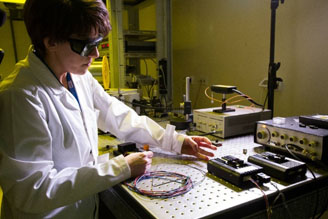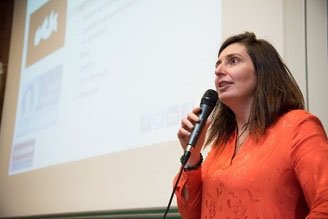NATO celebrates leading women in science
To mark the International Day of Women and Girls in Science, meet three scientists playing leading roles in activities under the NATO Science for Peace and Security (SPS) Programme.

Prof. Dr Zehra Yeğingil
The International Day, established by the UN General Assembly in 2015 and held every year on 11 February, is a reminder that women and girls play a critical role in the international science and technology community, and that their participation should be strengthened. The stories below show examples of outstanding women leading key NATO scientific projects in the areas of science, technology, engineering and mathematics (STEM).
Prof. Dr Zehra Yeğingil is a nuclear physicist, born in Ankara, Turkey. She leads the SPS Multi-Year Project “Determination of Exposed Dose and Radioactive Source Identity in Radiological Emergency”. This project aims to develop a small, wearable panel to accurately and rapidly assess doses of radioactive contamination on individuals.
In her youth, she was one of the brightest students in her class, particularly in science.
“I entered the Physics Department at the Middle East Technical University in 1973 as one of five female students out of 40 in the class. I loved science the way other people love music — for the profound enjoyment that it gave me.”
Her first experience of working with the NATO SPS Programme was as a young post-doctoral researcher, and it played a vital role in her research and professional development. “As a young researcher, support from NATO grants greatly impacted both my academic productivity and career path.”
Prof. Yeğingil also faced challenges as a young woman in the STEM fields and is convinced of the importance of women’s participation in scientific progress. “My graduate experience in science was of an academic culture that provides inadequate direction and mentoring for women, thereby eroding their self-confidence. With no support or connection with an advisor, taking risks in the lab becomes difficult.”
She emphasises that mentoring is the most important thing that scientists (both male and female) can do to empower young women in STEM careers. “Mentoring should be recognised as an important part of the service within a department and university, and should be enabled with flexible teaching schedules for the faculty.”
Outside of the laboratory, she likes to garden and enjoy the fresh air and sunshine. “I like to experiment in the garden by changing the conditions and growing a wide range of different crops. I grow fruit, vegetables, herbs and olives in our garden. Growing our own food and bringing it to the table is one of the most rewarding things about this hobby.”

Dr Nadia Boetti is an Italian senior research scientist in the fields of engineering and architecture. She leads the SPS Multi-Year Project “Compact Eye-safe Lidar Source for Airborne Laser Scanning (CALIBER)”. The project aims to develop a novel, efficient and compact laser source to be installed on small drones to protect borders, infrastructure and strategic sites.
Dr Boetti took to STEM at a young age and was encouraged by her middle school teachers to attend a scientific high school.
“During these school years, I began to be more interested in applied sciences and mathematics became mainly a tool to understand other scientific subjects like physics, chemistry or biology. At the end of high school, I decided to study physics – a subject that helps you to understand the world around you, from the largest galaxies to the smallest subatomic particles.”
Working with the SPS Programme has given her the opportunity to grow as a scientist and to expand her network in the scientific community. “My leading role in this project was considered a key achievement by my institution, and helped to turn my work contract into a permanent one.”
Dr Boetti recognises that attracting and retaining women in the STEM fields will lead to new ideas and perspectives, and encourages more varied approaches guided by a broader array of experiences. She believes that there is more that can be done to empower young women in science.
“One important action is for research centres or engineering companies to host open days, where families with children and teenagers can visit the laboratories, meet scientists, and have an idea of what it’s like to work in STEM.”
Although balancing a full-time scientific career and family does not leave Dr Boetti with a lot of free time, she always finds ways to fit her favourite hobbies into her schedule.
“One of my passions is reading, so considering the lack of time, I’ve found a wonderful solution by listening to audiobooks that allow me to “read” while I’m driving or doing other activities. I also love the mountains: hiking in summer time and cross-country skiing in winter time.”
Prof. Sofie Pollin is an engineer, mother of two and professor at the Katholieke Universiteit Leuven in Belgium. She leads the SPS Multi-Year Project “Large-Scale Collaborative Detection and Location of Threats in the Electromagnetic Space”. This project aims to develop an accurate, autonomous, fast and secure system that identifies intruders in the electromagnetic space.
“I entered the field of STEM as I was looking for a challenge and wanted to solve real problems for society. I attended an all-girls high school and did not realise that this field would be so male-dominated.”

Prof. Pollin particularly likes working with the NATO SPS Programme because it allows her to work and network with partners that are not necessarily based in the European Union. “Researchers in the United States, or in Morocco, have such different challenges but also see different opportunities. Listening to them helps to ask the right questions and keep a meaningful focus in my research.”
She has been inspired by many of the women scientists she has met during her PhD. “They inspired me to speak up when I wanted, but to make sure I always listen to what others have to say as well.”
Prof. Pollin strives to immerse her two young daughters in her own field of research as much as possible. “As chairman of the engineering alumni association, I award the best student design project every year. Last year, I took my daughters to the award ceremony for the engineering architects. The main feedback my daughter had was: ‘I see a lot of girls in the audience, but why are all four finalists for the engineering award boys? Are they better?’ I quickly explained that it was just by chance, and that girls are as good in designing buildings as boys.”
According to UNESCO, women represent less than 30 per cent of the world’s researchers, and only one third of STEM students. Through the SPS Programme, women scientists are leading innovative, security-related research and development projects, and are inspiring young girls to get involved in STEM. NATO celebrates women in science, acknowledges the challenges that they face, and strives to remove obstacles to equal participation in science, technology, engineering and mathematics.
